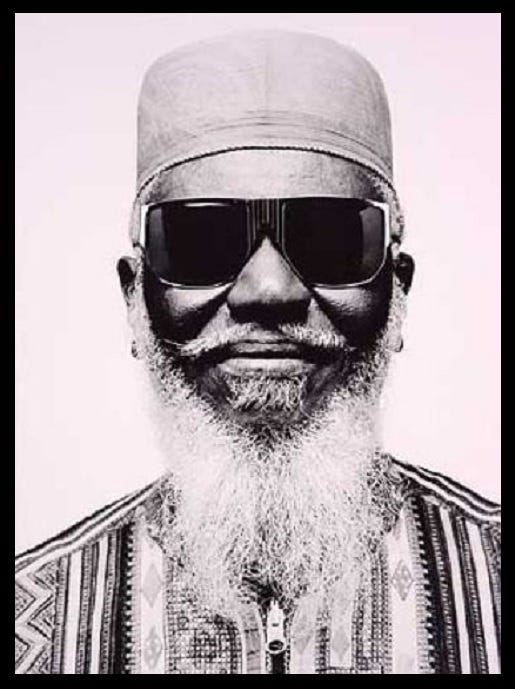Pharoah Sanders (October 13, 1940 – September 24, 2022) – Pharomba (1978)
This phenomenal jazz-funk jam was written by Sanders for his Love Will Find A Way LP, produced by Norman Connors and featuring Lenny White on drums.
Watch full video on YouTube.
View most updated version of this post on Substack.
Pharoah Sanders was mentored by Sun Ra, famously collaborated with John Coltrane, and was considered by many to be Trane’s musical heir. A leading proponent of spiritual jazz, he released over thirty albums during his highly influential solo career.
Ferrell Lee Sanders was born in Little Rock, Arkansas. His first instrument was clarinet, which he played at church as part of a worship band that accompanied hymns. In high school he learned to play the tenor saxophone. He moved to Oakland, CA in 1959 and attended Oakland City College, studying art and music. While there he met John Coltrane for the first time in San Francisco.
Three years later in 1962, Sanders relocated to New York City, where he struggled to make ends meet. He was mentored by Sun Ra during this period, who gave him a place to stay and some of his earliest East Coast gigs sitting in with the Arkestra, but did not, contrary to some accounts, give him the name “Pharoah.”
“I used that name before we ever even met, before I’d ever even known about who Sun Ra was,” he explained in a 2021 interview.
“My grandmother, she named me from the Bible. At first, she named me “Pharoah,” then she decided that might be a little hard, getting along with the system, I guess, so she decided to name me Ferrell. So when I moved to New York, later on, I had to join the musicians’ union, and they give you documents to fill out. And one thing I read is that you could have an artist’s name, so I decided to put “Pharoah,” and that’s how that got started.”
He began collaborating with Coltrane in June, 1965 with the recording of Ascension, a landmark album released the following year that saw Coltrane supplement his classic Quartet with up-and-coming musicians. Besides Sanders, other personnel included Freddie Hubbard on trumpet, Archie Shepp on tenor sax, and bassist Art Davis.
In September, 1965, the John Coltrane Quartet played a two-week stretch at the Jazz Workshop in San Francisco. Sanders went to one of the early shows and was invited to sit in. Afterwards, as Sanders recalled years later, “(He) told me then that he was thinking of changing the group and changing the music, to get different sounds. He asked me to play with him.”
Sanders and multi-instrumentalist Donald Garrett were both officially invited to join the band at the end of the two week engagement. Sanders went on to record several more studio and live albums with Coltrane in which they explored new sonic directions, including Om, Kulu Sé Mama, and Meditations (all recorded in late 1965), and Expression, recorded in early 1967 and released that September, two months after his death. It was the last album Coltrane personally supervised.
Starting with his second solo album Tauhid, released in October, 1967, Sanders put out a series of seminal late 60s / early 70s albums on the Impulse! label. He carried on Coltrane’s spiritual jazz legacy in these works, and recorded several albums with his widow Alice Coltrane from 1968-71. For his own 1969 LP Karma, Sanders wrote the nearly 33-minute masterpiece “The Creator Has A Master Plan” which was initially split into two parts in order to fit on one record. It became a centerpiece of his live sets, including this beautiful performance filmed in Frankfurt during 1986 with Bill Hicks accompanying him on piano.
In 1977, Sanders signed to Arista Records, the record division of Columbia Pictures founded and run by Clive Davis. With producer Norman Connors, he recorded his first album for the label, Love Will Find A Way. Released the following year in 1978, it featured Phyllis Hyman’s vocals on three tracks and an all-star lineup.
Sanders played tenor and soprano sax plus percussion, and Connors contributed timpani, drums, percussion, gong, and vocals. Other players included Ernie Watts on reeds, Oscar Brashear on trumpet, George Bohanon on trombone, Melvin “Wah Wah Watson” Ragin and David T. Walker on guitar, the great session drummer James Gadson, and Hubert Eaves III on keyboards,
The album’s phenomenal jazz-funk jam “Pharomba” was written by Sanders, and featured special guest Lenny White on drums.
Further info:
“Pharoah Sanders: 'If You're in the Song, Keep on Playing',” interview, The New Yorker, January 12, 2020.
“ 'I Just Have To Make Sure I Mean Every Note…' Pharoah Sanders Remembered,” 2021 interview by Dave DiMartino, Mojo Magazine, September 27, 2022.
#jazz #funk #SunRa #JohnColtrane #NormanConnors #PharoahSanders







